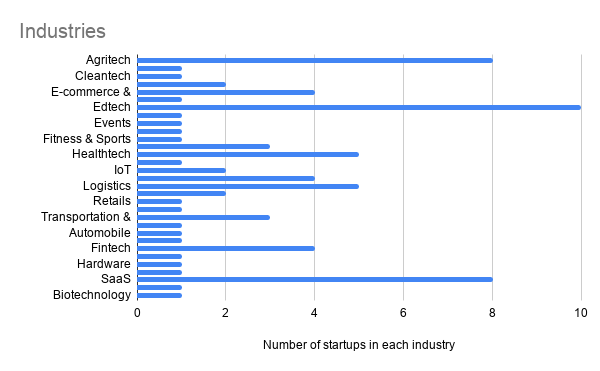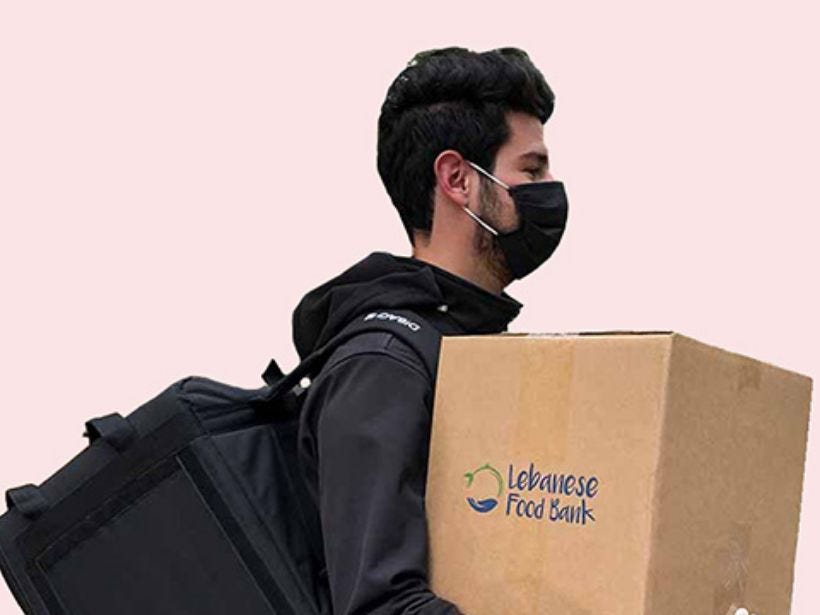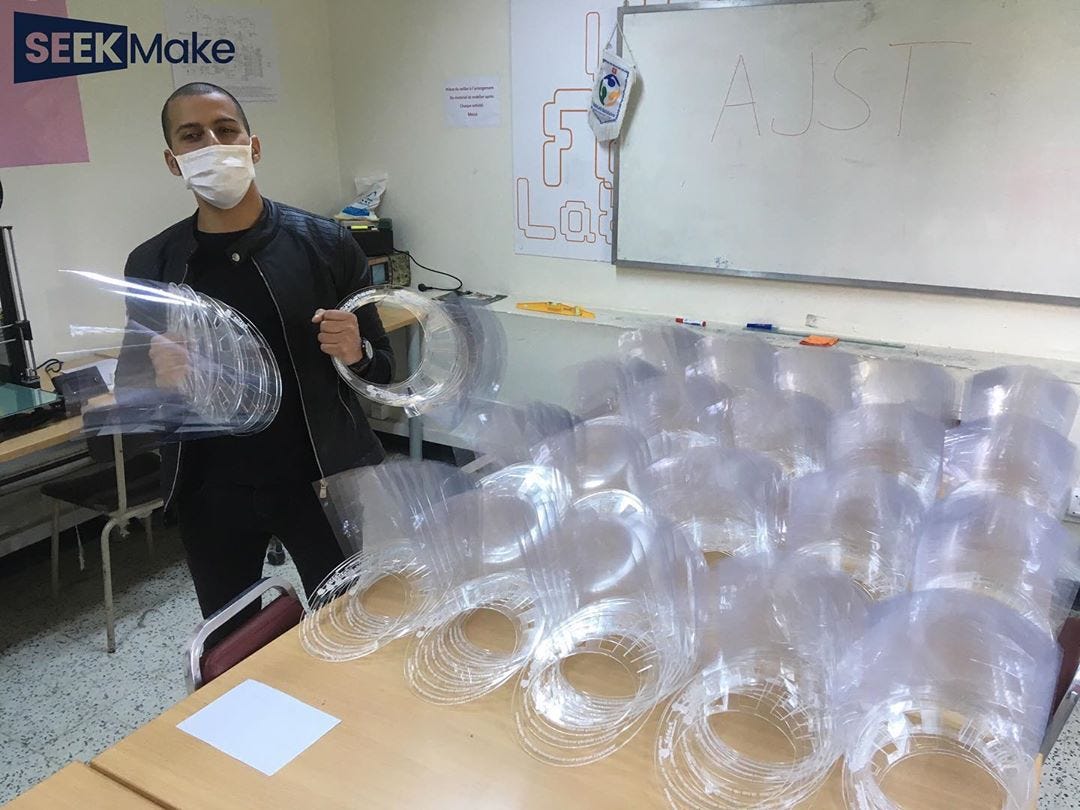During this pandemic, some industries will grow exponentially, while others will struggle to stay afloat. We set out on surveying a sample of 80 active startups to observe how our founders are maneuvering the pandemic, what is needed for survival and for continued growth and scalability, and how should the founders capitalise on the current situation to maximise their revenues, raise their brand awareness, and develop new products and services.
Our startups are in the edtech, agritech, healthtech, logistics, fintech, IT, transportation & travel, and SaaS industries, and it has been noticed that those whose business models depended heavily on legwork (the physical presence of someone on the job), have either shifted their operations completely online, halted their operations for the time being, or continued operating normally due to the nature of the business model that allows them to do so (for example: the delivery of essential products such as medicine, food, water, & sanitary).
52.6% of the startups surveyed required legwork, and as previously mentioned, were the startups majorly affected by the outbreak, whereas the 46.2% percent that didn’t depend on legwork at all, seem to be either operating normally or their businesses are booming.
With around 61% (49 startups) of the startups sampled not operating normally, approximately 81% (40 startups of the 49 startups) have already devised plans, strategies, and even new business models that allow them to adapt to pandemic, which will be discussed shortly. These startups are in the transportation, travel, agritech, logistics.

The rest of the startups are either operating normally or beyond normal capacity because of the pandemic, and they are in the Edtech, SaaS,
The rest of the startups are either operating normally or beyond normal capacity because of the pandemic, and they are in the Edtech, SaaS, Fintech, E-Commerce, and IT industries.
Industry Breakdown
Agritech
Around 62% of the startups in agritech require legwork, this is because the nature of the job itself demands the installation and maintenance of tech equipment that aid and makes their processes more efficient. Hence their ability to work at normal capacity is affected.
LifeLab Biodesign (Flat6Labs Beirut): They are delaying the legwork farther into the process until the lockdown is lifted. LifeLab designs and deploys fully-automated, climate-controlled vertical indoor farming technologies.
IoTree (Flat6Labs Beirut): They are currently pushing out new features into their already installed products/services to be capable of retaining clients after the outbreak. IoTree is a wireless sensory network of smart traps that are developed using a deep learning algorithm for the early detection of harmful pests and insects in farms.
Conative Labs (Flat6Labs Cairo): They are rescheduling deliveries and dividing the teams so that the workplace isn’t congested. An IoT-enabled water quality monitoring and alarming system for aquaculture.
The plans that they both have devised seem to be common across many of the agritech startups at the moment, and are helping them mitigate the situation.
Healthtech
The results of the healthtech industry were inconclusive, as our startups have very different business models, and most of them require legwork (60%).

Chefaa & Pharmaklik (Flat6Labs Cairo & Beirut): It is important to note that although legwork was required, some businesses weren’t incapcitated by it as they use delivery services to bring medicine to homes. Chefaa, a Flat6Labs Cairo startup, and Pharmaklik, a Flat6Labs Beirut startup, are examples of startups doing well because of the service they provide. Chefaa have also added a new application feature that allows customers to know all about the latest updates of the COVID-19.

MedMisr (Flat6Labs Cairo): They are offering their services at discounted rates. MedMisr is a digital third party administrator providing medical insurance companies an innovative online paper-free solution with fraud controls.
Logistics, Travel, & Transport
Transportation (e.g. ride-hailing), automobile and travel booking platforms have been reported as one of the most “at risk” industries — however, should some startups adapt to the current changes in customer preferences and consider instead the delivery of groceries or medical supplies, they may have a more sustainable business while ensuring they take their customers best interest into consideration (quality and price-wise).
Transpooler (Flat6Labs Cairo): They are considering using their transport tech platform to cater to a different sector (previously students) which would utilize their services more, while managing their expectations it will be still be difficult to acquire customers and convince them to use the platform. Transpooler helps schools and nurseries to monitor their fleet service and offer parents and students live tracking, speed monitoring and chatting.
Wantotrip (Flat6Labs Tunis): They have convinced their travel customers to retain the amount they already paid as credit for future trips (rather than refund) in an attempt to keep their customers on their platform and utilize it once they’re able to travel again. Wantotrip is an international travel platform offering authentic and themed travel packages around the world for communities or individuals.

Shabeb Delivery (a Presentail company) & Hommy Cook (Flat6Labs Beirut & Bahrain): Startups in the logistics industry with a focus on food delivery seem to be doing exceptionally because of the rising need for distancing and having a contactless life during this period. Shabeb is a quick last-mile delivery service for your business, they have also collaborated with the lebanese food back to deliver food to unfortunate families’ doorstep. With the press of a button, we’re at your door in minutes. Hommy Cook helps cooks make money by selling their home cooked food to thousands of customers through Hommycook.

Hovo (Flat6Labs Cairo): They are using the current period as an opportunity to raise brand awareness and have an increased community involvement. They are buying essentials for the elderly and vulnerable families and delivering it to their doorstep. HOVO is a tech-enabled logistics partner that provides trucks in 20 mins across Egypt.
SaaS & IT
Since almost everyone is, at the moment, dependent on online management tools and services that make work life seamless, it was imperative to see that SaaS startups are doing well and even exceeding expectations. In regards to IT, startups were mostly doing well without any legwork, however, some startups that dedicated their services to restaurants for example, weren’t doing that great.
Untap (Flat6Labs Cairo): Untap is collaborating with high profile companies to manage competitions such as organizing an online regional hackathon for Dubai Future Foundation. They have also launched One Million Arab Coders initiative to find solutions to the challenges posed by COVID-19. Untap is a submission management system used by organizations to easily launch and manage online prize-based competitions and calls for applications.
Nural Technologies (Flat6Labs Bahrain): This startup built around the idea of online management of teams and tasks seem to be doing exceptionally well during this period without much required adaptation.
E-Robot (Flat6Labs Tunis): Have shifted most of the engineers work online. E-robot Software develops IT automation solutions to create web and mobile applications without code writing.
Fintech
It is normal to see that the Fintech industry is booming during the pandemic, this is largely due to people seeking safer alternatives to banknotes. In fact, some governments are adapting that kind of technology into the national banks. There was one drawback anyhow, which is financial inclusion. Around 25% of the startups that had its primary focus on financial inclusion through their services are operating below normal capacity. It is important to highlight this shift in the industry trend because during these times, it is even more important to find a way to get to those who are unbanked.
Juno (Flat6Labs Beirut): This startup is targeting the unbanked population and has moved most of its operations online, but they are facing difficulties reaching potential customers. Juno digitizes banking focusing on simplicity and personalization to provide financial services.
-Edtech
It’s no surprise that the outbreak will dramatically transform the global higher education sector creating a new normal for how courses will be taught moving forward; in short, it will revolutionize the online learning landscape which can translate to potentially successful ventures for startups in the Edutech industry.
GoMyCode (Flat6Labs Tunis): GoMyCode has already started adapting by selling online via Facebook and decided to kick off their e-learning platform in the coming few days instead of this September as planned. In an effort to popularize their brand and attain their customers, their platform will be temporarily for free and they managed to also create a community of teachers who will be volunteering. GoMyCode is High-end computer Science Education startup with a unique learning experience that leaves lasting impressions and positively impact our students’ lives.
Spica Tech (Flat6Labs Beirut): Spica Tech has started building an online community surrounding their students where they can share their learnings and progress on the online coding and storytelling program available on the platform — which has been since heavily promoted in order to offset offline learning that some of the students were accustomed to. Spica Tech academy teach kids (5+) and teenagers game development as a way to reshape Science, Technology, Engineering, Arts and Math.
On a regional scale, it has been reported that startups which rely more on legwork are facing increased difficulties managing their business, as well as shifting to the digital landscape since they’re not acquiring enough subscriptions or having sufficient equipment essential for creating content.
E-commerce & Shopping
Cleaning supplies, personal hygiene, supplements among others that the everyday consuIt’s no surprise that the startups that are most likely thriving nowadays are e-commerce platforms where they provide and deliver everyday necessities, from products ranging from healthy snacks,mer will find beneficial in order to combat the new “normal” lifestyle they’re leading today.

Mint Basil Market (Flat6Labs Beirut): This startup is focusing on products that their customers will continue to value in the months to come, and they have been lately adding a new immunity boosting collection of products, ensuring that their platform will be able to fulfill the needs of those who are navigating towards a more healthy lifestyle from the comfort of their home since they also include free delivery (while taking the vital safety precautions). Mint Basil Market is an e-commerce platform that offers a wide range of healthy, natural products, from food to cosmetics, and which can be delivered straight to people’s doors.

SeekMake (Flat6Labs Tunis): In order to help the doctors who are facing the COVID-19 pandemic in Tunis, Seekmake has mass produced masks to help protect frontline doctors who are dealing with the pandemic daily. SeekMake is a marketplace linking CNC, laser machines and 3D printer owners with designers and end users.
Dabchy (Flat6Labs Tunis): A Flat6Labs Tunis startup is increasing their marketing efforts to maintain their involvement in communities by pushing out empathetic messages. They are aiming to reach more people by opting for more ads and less organic content in this period of declining sales and unengaged people. Dabchy is a women marketplace that allows women to revamp their wardrobes easily: they can earn money by selling their used clothing online, buy other clothes at discount prices and share their personal style.
Startups that have a B2B business model or B2C but provide non-essential products and services, such as clothing, jewelry and the like, won’t find success since their customers buying power is on an all- time low for luxury products instead shifting their preferences to food, vitamins, everyday home essentials, sanitary products, among other items that will need to constantly purchase for an unpredicted time frame. An additional problem for these startups is that should they decide to promote their businesses, they can come across as tone-deaf to the financial situations of their audience — it’s increasingly challenging for them to keep their business afloat while retaining the praise of their customers simultaneously. However, the silver lining is that some startups can find success should they be able to pivot by changing their business model to selling products that people can benefit from during their home quarantine (such as home gym equipment, books, toys and games).
Our main takeaways
The industries most negatively affected by this phenomenon were: transportation, travel, agritech, & logistics. On the other side of the coin Edtech, SaaS, Fintech, E-Commerce, & IT seem to be doing relatively well.
For all of the startups, it is highly advised that you begin looking for cash & funding, and cutting down costs without affecting the operations of your businesses. It is also important to start working on research and development, perhaps even pivoting to accommodate the current needs of the market.
When it comes to marketing and sales, if you can’t see your startup being of any help to the people, work on raising brand awareness but be sensitive to other people’s pains. It is due time for some good CSR. Also, a good strategy moving forward with your sales is to offer people discounts, giveaways, and free services in return for their loyalty, and sell (mostly) the things that they need the most at the moment.
It is also a good opportunity for startups to start going online, find a way to make their business become mostly cloud-based. If you can do that, you can truly future-proof your startup.
Check our #StartSmart Webinar recaps:
–“How to Take Off Your Startup During COVID-19” here.
–“How to Out-Innovate” here.

